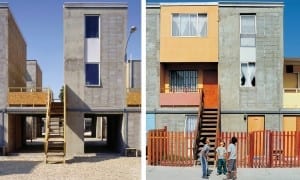Chilean architect Alejandro Aravena known for pioneering social housing projects wins 2016 Pritzker prize

Photos from Jan. 13, 2016 Guardian article (see link at this post). Captions reads: “In Iquique, Chile, Aravena provided a concrete frame, with kitchen, bathroom and a roof (left), which were designed to allow families to fill in the gaps (right). Photograph: Cristobal Palma.”
A Jan. 13, 2016 Guardian article is entitled: “Chilean architect Alejandro Aravena wins 2016 Pritzker prize.”
The subhead reads: “Social housing visionary, who engaged residents in designing their own homes, urges architects to address issues of poverty, pollution and segregation.”
Alejandro Aravena: architect, equaliser, el visionario
The opening paragraph reads:
“The radical Chilean architect Alejandro Aravena, known for his pioneering social housing projects in Latin America, has been named as the winner of the 2016 Pritzker prize, the highest accolade in architecture.”
Click on photo to enlarge it
The link in the above-noted paragraph refers to a Feb. 6, 2014 Guardian article entitled: “Alejandro Aravena: architect, equaliser, el visionario.”
The subhead reads: “The award-winning Chilean designer has made it his quest to create buildings that remove cities’ natural divisions.”
The Productivity Project (2016)
I am reminded of a passage (pp. 4-5) in The Productivity Project (2016):
“During the 1960s and 1970s, the University of California at Irvine was one of a group of universities that decided to build their campuses without any paths. (I went to school in Canada, but I love this story.) Students and faculty simply walked in the grass around the campus buildings as they pleased, without following a walkway that was already paved for them. A year or so later, once the school could see where the grass was worn around the buildings, they paved over those paths instead. The sidewalks at UC Irvine don’t simply connect the buildings to one another in a predetermined way – they’re mapped to where people naturally want to walk. Landscape architects call these paths ‘desire paths.’ ”
[End of text]
Ontario Today, Jan. 14, 2016
The above-noted book was the subject of a CBC Radio, Ontario Today broadcast, which I found of much interest, entitled: “What slows you down?”
An online note reads:
After graduating from university, Chris Bailey embarked on a year-long experiment to figure out what makes him more productive and what slows him down. He went several weeks with little sleep; cut out caffeine and sugar; got up earlier; worked longer. The result is his new book, The Productivity Project: Accomplishing More by Managing Your Time, Attention and Energy.
Related links
The path to meaningful work: Chris Bailey at TEDxGatineau
Listen to the Jan. 14, 2016 CBC Ontario Today podcast with Chris Bailey here >
Ten tips for being more productive
10 tips to make you more productive in 2016
The above-noted link features the following 10 tips from Chris Bailey:
1. Consume caffeine strategically, not habitually.
2. Work on your hardest, highest return tasks at your peak energy time of the day.
3. Group grocery shopping, choice and maintenance tasks on a specific day.
4. Compartmentalize email and social media to specific times.
5. Take quick, frequent breaks throughout the day.
6. Focus on one task at a time. Multitasking is simply less productive.
7. Allow your mind to wander a little every day, so creative solutions can bubble to the surface.
8. Schedule least time for important tasks.
9. To get more done, strive for imperfection.
10. Slow down, so you’re able to work more deliberately, and with intention.
[End of text by Chris Bailey]
Update
A Jan. 17, 2016 Guardian article is entitled: “Sweet nightmares: a guide to cutting down on sugar: Sugar is making us fatter and sicker. Yet we still don’t realise how much we’re eating. As the government considers imposing a tax, we look at how to cut down without missing out. Plus: alternative recipes.”

Leave a Reply
Want to join the discussion?Feel free to contribute!